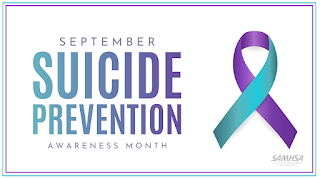September 10th is World Suicide Prevention Day
Amy Clay, School Psychologist
(Brunson Elementary, The Downtown School, Wiley Middle & Parkland High)
September is designated as National Suicide Prevention Month, in order to educate and involve others in the prevention of suicide. The American Foundation for Suicide Prevention (AFSP) reports that suicide is the 10th leading cause of death in the United States, with approximately 42,773 deaths per year. Here is AFSP's Fact Sheet on how suicide impacts us in North Carolina:
The National Alliance on Mental Illness shares these warning signs for suicide risk:
- Threats or comments about killing themselves, also known as suicidal ideation, can begin with seemingly harmless thoughts like “I wish I wasn’t here” but can become more overt and dangerous
- Increased alcohol and drug use
- Aggressive behavior
- Social withdrawal from friends, family and the community
- Dramatic mood swings
- Talking, writing or thinking about death
- Impulsive or reckless behavior
As this issue of suicide is not unique to our country, September 10th has been designated as World Suicide Prevention Day. The International Association for Suicide Prevention (IASP) is a global organization dedicated to preventing suicidal behavior and alleviating its effects. IASP also provides a forum for academics, mental health professionals, crisis workers, volunteers and suicide survivors. The IASP website - as well as the NAMI and AFSP links included above - provide a number of resources, including toolkits to help with intervention, as well as guides to assist survivors. The Substance Abuse and Mental Health Services Administration (SAMHSA) also has a wealth of excellent information on this topic.
Here are some suggestions from SAMHSA if you believe someone may be thinking about suicide:
- Ask them if they are thinking about killing themselves. (This will not put the idea into their head or make it more likely that they will attempt suicide.)
- Listen without judging and show you care.
- Stay with the person (or make sure the person is in a private, secure place with another caring person) until you can get further help.
- Remove any objects that could be used in a suicide attempt.
- Call SAMHSA’s National Suicide Prevention Lifeline at 1-800-273-TALK (8255) and follow their guidance.
- If danger for self-harm seems imminent, call 911.
Winston-Salem/Forsyth County Schools has trained student services personnel on a process for responding when we are notified that a student may be thinking about suicide. The Department of Psychological Services also produced a pamphlet this summer that contains information on facts, tips, risk factors, prevention and intervention. Those pamphlets are being delivered to school personnel through the school psychologist assigned to each school in our district. Our goal is to ensure that all school personnel know that we have a process in place to respond when a student is believed to be at risk for suicide. Your school psychologists, school counselors, social workers and other student services personnel are here to help. If you have concerns about a student, please contact us.





Comments
Post a Comment